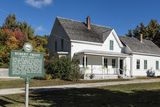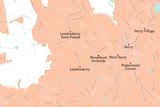Residents of Derry and Londonderry explain the two US towns which were once united







A last-minute campaign stop by a former president at a New Hampshire high school put the town of Londonderry in focus for those living here.
Donald Trump was victorious in New Hampshire’s Republican presidential contest on January 23 and while voters in the United States gear up for a potential November rematch between him and Joe Biden, it is the town’s location — and its neighbouring town of, yes, that’s right, Derry — that drew Review’s attention.
The southeastern New Hampshire towns were once united in a 100-square-mile tract of land previously called Nutfield. In 1721, Londonderry came into being, three years after the arrival of Scots-Irish emigrants fleeing the northern Irish county. In July 1827, one town became two, the new taking its name from the original name of Londonderry, meaning a hill covered in oak trees.
Since then, both have existed side by side, with some perhaps understandable rivalry, each focused on developing what they offer to visitors and residents.
Derry and Londonderry in New Hampshire
It is a location where the closest airport is almost exclusively in Londonderry, bar its front door, and where plans are in place for a specially created city.
But what is life like for those living in towns with different claims to fame?
Review spoke to three residents and workers in Derry and Londonderry to see how they fare to our own Maiden City.
Deb Paul is the publisher of the Londonderry Times, a free weekly community newspaper that she started and on which she works with her husband.
“When I moved there was no paper and I didn’t understand how things worked.
“We voted down something and the next thing I know, they’re building it. Everybody voted down a power plant and the next thing I know we had a power plant. I didn’t understand and I figured if I didn’t understand, other people must not understand,” she explains.
The Londonderry Times was one of four papers Deb founded over 20 years ago, two of which were shut down during Covid, and has moved from monthly to fortnightly and finally, weekly distribution.
“They are free mailed to everyone because information should be free,” she says. “We’ve made a lot of changes and we keep an eye on things. The government hates us but the residents love us.”
Derry has approximately 33,000 residents and Londonderry has approximately 26,000. A Google search will explain the area is famous for apples and while Review is reliably informed they are ‘very good apples’, the humble spud is also lauded. In fact, the state vegetable is the white potato, believed to have been initially cultivated from a sack of seed potatoes brought by an Irish immigrant.
The towns may be similar in size but have very different characteristics. That said, living near the highway that divides Derry from Londonderry, Deb describes residents as friendly, giving and helpful.
“It’s not really what you would call a destination town,” she says of Londonderry.
In truth, both it and Derry sound like what you imagine New Hampshire towns to be, a blend of commercial activity with a nod to their agricultural heritage.
“We have 70 acres up in the north part of Londonderry that is called the Musquash. It’s conservation land and they have what look like houses that are built on the ground, almost like out of a nook, kind of Hobbit looking,” says Deb.
“Derry is known for [first American astronaut] Alan Shepard and Robert Frost farm [home to the poet’s family 1900-1911]. They have a couple of really nice ponds that you can go fishing and boating, that sort of stuff. It’s more of a recreational kind of town, it’s not a destination town like going to Boston.”
The Robert Frost farm in Derry, New Hampshire
Having worked in Derry for the last 15 years, Doug Cullen, manager of career services at Pinkerton Academy, has noticed a ‘revitalisation of the community’ that’s given it more of a walkability factor.
“That small shop retail, for lack of a better term, almost a European feel is what we’re trying to develop and that has been somewhat successful,” he says.
“The other aspect of it that’s been growing is really our industrial base, from being an older community that was very agrarian to a more industrial base in a very positive way.
Firat American astronaut Alan Shepard
“We are seeing an increase in the number of businesses, not just smaller businesses, but larger businesses that are coming into the Derry and Londonderry area including an advanced highway infrastructure that’s being modified to accommodate that even at a greater level.
“We predict that over the next two years, that’s going to be even increased beyond where it is today, because of a change in our highway system that will enable greater industry to appear here.”
Doug Cullen, manager of career services at Pinkerton Academy
The town in which he works has maintained more of its historic aspect, while Londonderry is home to more larger industrial organisations including manufacturer Pratt and Whitney, New Balance, FedEx and UPS.
“Derry has a really vibrant downtown,” says Deb. “And East Derry is all farmland and it’s absolutely stunning with beautiful historical houses, which leads into Chester which was going to be the capital of New Hampshire. Derry is more city-like and we’re more rural but not by much.”
David Ellis has been living in Londonderry for 40 years, having moved to the United States in the mid-1970s.
After a decade in Massachusetts, he and his wife moved to New Hampshire to be close to his role in a US computing company.
“New Hampshire is a state that does not have an income tax. We still pay federal tax in all the states but a lot of states have about a 5% income tax on top of that. It normally funds things like schools, education, keeping up the state highways,” explains David, who grew up on the edge of Dartmoor.
“In New Hampshire, they put it all on property taxes so that we have very high property tax but no income tax.”
Boyhood home of poet Robert Frost in Derry, New Hampshire
He describes Londonderry as a commuter community for Boston, which is located about 40 miles south.
“The thing that struck me coming from England over here, the houses are far more spaced out in England. I grew up in a village community. You went to the edge of the village and you were in farmland for two or three miles, there was no housing,” says David.
“Over here the town has an ordinance that you cannot put a house on less than an acre and a quarter of land. Many of them are on even larger lots. You drive down a typical road through a housing development and the houses are spaced at least 150 to 200 feet apart.”
David Ellis with granddaughters Abigail and Hannah
Similarly this ‘different kind of lifestyle’ can make it more challenging to make regular friends, says David who would enjoy a monthly dinner with his neighbour.
“In England, we had a pub life and I think Ireland has the same thing. Two or three nights a week, we’d go down, sometimes we’d play snooker, sometimes skittles. That doesn’t exist in the US.”
What is important is history, and within Derry, Londonderry and the neighbouring towns, there are plenty with an active interest in their European heritage.
When asked, all agree that residents would be aware of our similarly named city and county across the Atlantic.
“As a matter of fact when I was a town councillor I tried to initiate a sister city programme with you guys in Londonderry with us,” says Deb.
“It fell through the cracks, [but] I’m going to try it again. Once we have elections in March, I’m going to bring it up to see if we can engage in that again.”
Since his retirement, father of three David — ‘when I was in school in England I detested the subject’ — has become interested in Londonderry’s history and volunteers as a researcher with the local Historical Society.
“They would be aware of it [of the Northern Irish location] but wouldn’t realise that Derry and Londonderry are different names for the same town.”
Political engagement, however, is another aspect, something which David has found does not compare to England.
“I have three brothers and my father drummed into us that the right to vote was something that people have worked very hard for so it was your duty to turn out and vote. I find over here the franchise that we get at elections, even presidential elections, is outrageously low by my reckoning.”
He mentions the town’s 2023 deliberative election which was open to all those eligible to vote.
“We’re supposed to go to that session which lasts about two to three hours, and they present all of the things that will be on the ballot. You discuss whether the school budget is too big, too high, this kind of thing and you pull it apart.
“Last year when it ran, out of those 26,000 population, we had only 100 people turn up.”
Deb says it’s a ‘really touchy question’ when asked about residents speaking out, saying the community is a ‘mixed breed’.
“We have people who are born and bred here, and then you have the good old boys who came in and took over all of the politics and run the town. And then you have the poorer people [who] are the ones who really do all the work as far as events and they’re working to take care of people,” she says.
“They’re the ones who care the most if you ask me, the poorer people in your community give the most because they know what it’s like not to have. And so, on that note, I’ll say that it’s very mixed.”
Encouraging the younger demographic to stay in the region is something at the heart of Pinkerton Academy, the state’s largest independent high school with approximately 3,200 students.
“One of the things that draws families to the area is just the amount of opportunities that we are able to offer,” says Doug who is of Irish descent.
“In our particular case, we’re able to take over and be the secondary school for many towns because they simply can’t reproduce at the cost level [so] they can just simply bus our students to here.”
Read more
His role includes managing and monitoring internship and job shadow field experiences for students across a variety of career fields.
This form of apprenticeship was stripped out of the American educational system post World War Two.
“We have over the last 30 years trying to integrate that back, but it’s been a very slow walk,” he says.
“In the United States for many, many years, it was really a push that you’re going to finish secondary school and then you’re going to go to university. That was the nature of the beast.
“That has now changed because of the cost of higher education being one but also it’s also forcing students to leave the area and never return so it really hurt our economy.
“Although it tried to help, a one-size-fits-all, everyone going to university approach isn’t going to work, especially for many students who just weren’t cut out for a university setting. So the absence of having those industry connections really did hurt our economy here.
“Now that is starting to be revitalised by the development of industry partnerships along the way during the secondary placement, if you will, so students have a better understanding of what’s really within their community.”
Overall, all three interviewees are happy with where they work and reside.
“It has its moments; no place is perfect, right?” says Deb who moved to Londonderry from Boston for a better quality of life for her family.
“You move, it’s new and shiny and exciting, you’re amortised with it. It’s kind of like dating someone. And then you start realising they don’t put the cap on the toothpaste, [and] there’s things you start seeing that could be better.
“I have the philosophy of I’m not going to move because I don’t like it. This is now my home. I will fight to change it to make it better, as opposed to just say, ‘oh well, that’s what they say so that’s what I’ll do’.”
For David, fear of increased property taxes may mean he can no longer afford to live in his house.
“I have lived here longer than I have lived anywhere else. I had a very happy marriage here. I certainly don’t want to leave the town, my wife is buried here.
“My wife and I had at one time thought of moving to somewhere warmer. New England is a little cold but all our family is here.”
Change keeps coming. Three hundred years after its founding, Londonderry is getting something it’s never experienced: Woodmont Commons — a private development project turning more than 600 acres of land — most of it former apple orchard — into a city, with shops, parking and housing. It is anticipated to take 20 years to complete.
With this in mind, perhaps it’s no surprise that Doug is keen to highlight that this is a growing area, a location experiencing a rebirth in myriad ways.
“Our section of the United States is seeing that too,” he says. “New Hampshire has had its ups and downs, but we’re still considered one of the top areas to live in, because of the combination and Derry is certainly an indicator of this, because of the combination of work opportunities, as well as recreational opportunities.
“That’s just something that’s very attractive and one of the reasons my wife and I have decided to stay here instead of other opportunities throughout the United States.”
Join the Belfast Telegraph WhatsApp channel
Stay up to date with some of Northern Ireland's biggest stories













